Edits In Short: January 16
Didn’t get time to read the edit pages in today’s papers? Don’t worry. We’ve read them for you!
The Hindu, January 16, 2013

Support Independent Media
The media must be free and fair, uninfluenced by corporate or state interests. That's why you, the public, need to pay to keep news free.
ContributeStop baying for blood – Editorial
As the title suggests, the edit cautions India against any “indiscriminate blood letting” as far as its relationship with Pakistan is concerned. It feels that Dr Manmohan Singh’s “there can’t be any business as usual with Pakistan” statement is a “dreadful decision”. As are Sushma Swaraj’s “ugly calls for 10 Pak soldiers to be beheaded in retaliation”. This will play right into the hands of the Pakistan Army led by General Kayani, which has been trying its level best to escalate hostilities with India in order to roll back the détente initiated in 2003 as well as to invite international condemnation.
We don’t want a war and have covert and conventional means of handling the situation. It’s a malaise which edit states has no cure, and “can only be managed better or worse”.
Aman Ki Asha Part II?

The Congress kumbh mela – Main Article
Commenting on the upcoming congregation of Congress leaders in Jaipur, political analyst and former media advisor to the PM, Harish Khare writes that Jaiprakash Narayan’s prognosis of the Congress Party “that neither Mr. Nehru nor anyone else can clean up this organisation” has been proven right. Nehru, he writes, though promising to set Congress’ house in order, had done precious little on that score.
Indira Gandhi didn’t do any house cleaning either. “The promise of purge never materialised. Instead, the party became ‘a dung-heap of defectors’. The inevitable denouement was the rise of Sanjay Gandhi and the Emergency.” Then came Rajiv who did nothing, and eventually Sonia, who didn’t make any promise to clean up the party, just to hold it together.
“The Jaipur Kumbh Mela will be useful only if the Congressmen understand that they have the primary responsibility to respond to the new political economy of up-market assertiveness and down-market deprivations.” And to restore our constitutional order’s moral respectability.
Interestingly, the name of two-time PM Manmohan Singh never figured once in this entire article on the state of the Congress.

Green book, red herring and the LoC war – OP-ED
Praveen Swami writes that Pakistan’s Green Book – the Army’s biennial collections of essays by senior officers, “makes clear that its generals are seeking to provoke a crisis. India is pushing itself into their trap”. The supposed amendment in the book to identify internal insurgent forces as Pakistan’s main national security threat, he writes, is a red herring.
India he feels, has so far punished Pakistan’s aggression by covert and conventional means, and has managed to prevent a rapprochement between jihadists and Pakistan’s army generals by practicing restraint. The current calls for a “muscular” response to Pakistan, “like all gratification, will come with a price that probably isn’t worth paying”.
Here’s a sample of what’s in the Green Book: Brigadier Umar Farooq Durrani’s “Treatise on Indian-backed Psychological Warfare Against Pakistan” says that the Research and Analysis Wing (RAW) has waged psychological warfare through papers and TV channels like Zee TV, which is its media headquarters, through the creation of the South Asian Free Media Association, and through articles by scholars like Ayesha Siddiqa. “The most subtle form of this psychological war, the Brigadier states, is found in movies where Muslim and Hindu friendship is screened within the backdrop of melodrama.”
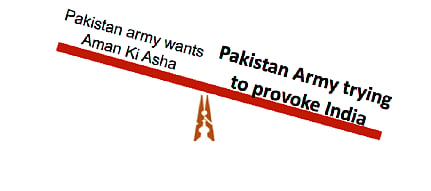
The Hindustan Times, January 16, 2013
A shadow of a shadow – Editorial
The BJP is in trouble comments the HT edit, not unsurprisingly. Sushma Swaraj’s statement that we want 10 Pakistani heads to replace the one Indian head reflects the position of the party and “is clearly an attempt to boost the BJP’s image at a time when the party is going through what can be only charitable be called a crisis”.
The edit is referring to the second term for Nitin Gadkari as BJP President with RSS backing. This is a man whom BJP leaders have criticised openly for his alleged role in financial irregularities in a company he was associated with. Making him President again will “demoralise the rank and file of the BJP”, according to the edit.
The edit also throws in a good word for the PM who “reached out to both Ms Swaraj…Arun Jaitley on the Pakistan issue”, and ends by writing that the BJP needs to step up to the plate if India is to consider alternative leadership.

Lost and not found – Main Article
Congress needs to show some spirit in Andhra Pradesh to remain relevant in the South, writes Lalita Panicker. While Jagmohan Reddy is busy cashing in on his father YSR’s legacy, the Owaisi-led MIM has got lots of publicity recently and withdrawn from the UPA. CM Kiran Kumar Reddy’s deafening silence on key issues like Telangana (which has been handed to the TRS on a platter), and Owaisi’s poisonous speech, is going to spell trouble for the Congress.
“He (Kiran Kumar Reddy) had better wake up fast if he has to have even a fighting chance of delivering the state to the Congress in the next election.”
The state government, she writes, has to signal its presence rather than watch silently as political developments around it take on a life of their own.
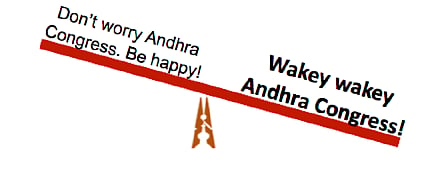
Indian Express, January 16, 2013
Above the din – Editorial
Tone it down on the anti-Pakistan rhetoric, says this edit. It denounces “jingoistic proclamations” by TV anchors and Sushma Swaraj demanding “ten heads” from Pakistan in return. The edit omits a few points. One, it mentions “Almost ten years of the ceasefire along the LoC (despite the recent strains on it)” but forgets that firing from the other side has often violated the ceasefire. Two, it says that the planned visa-on-arrival scheme for elderly Pakistani citizens was put on hold. The official reason given for this was that there were “no takers”. The Express doesn’t tell us if that really the case. It ends by saying that Pakistan isn’t even noticing the Indian hysteria as it has a number of problems of its own.
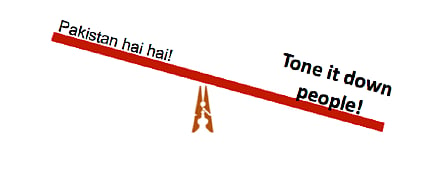
Full Article: http://www.indianexpress.com/news/above-the-din/1059964/
Beyond the cut – Editorial
With inflation easing slightly, the edit insists that the government must do more to attract investment. The RBI could now cut interest rates but says that “the government needs to do much more to push up investment plans and expenditure”. It also adds that the postponing of GAAR could have a stabilising effect on foreign inflows.
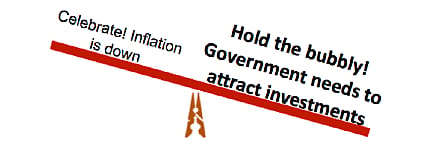
The hostility industry – Main Article
Congress MP and Rajya Sabha member Mani Shankar Aiyar takes his usual extreme dove stand stating that “uninterrupted and uninterruptible dialogue” is the only way forward in Indo-Pak relationships. He adds graciously, “We need most to talk when we are on the edge of war; least when the going is, in any case, good.”
Taking the tone of the Express edit he writes that there is a mindset change in Pakistan that a large part of Indian public is unaware about. Interestingly he calls the capture of Osama, “Obama’s kidnap and murder operation in Abbotabad”. He also displays a certain stereotyping talking of Pakistanis and Indian Muslims with words like Jum’aa prayers, wife’s biryani and burqa. Certainly there is more to Indian and Pakistani Muslims than that.

The Times of India, January 16, 2013
Stay the Course – Editorial
In the wake of the death of two Indian soldiers and the mutilation of their bodies by Pakistani troops, relations between India and Pakistan have gotten more strained. The Prime Minster’s warning note stated that India will not be able to do business with Pakistan if incidents like this continue. But public opinion on the matter in India seems to be emotionally charged, with leading BJP leaders making statements like “get the heads of 10 Pakistani soldiers if the head of Lance Naik Hemraj Singh cannot be brought back.”
New Delhi, therefore, must make it clear to Islamabad that provocative acts will be reciprocated with actions considered appropriate by the state, and if Pakistan makes efforts to improve ties with India, the latter will return the gesture.

Tame the Beast – Editorial
Comforting headlines tell us that inflation has hit a three-year low with the wholesale prices coming down to 7.2% in December. However, the edit points out that the prices of food products will shoot up by 11.2% – the highest increase in about two years. All thanks to high grain prices, which is difficult to comprehend given that grain production touched an all time high of 257 million tonnes last year. The reasons: higher procurement prices and large stocks being cornered by the government for the Food Security Act. This has disrupted the supply of grains in the open market as well as disturbed normal trade channels. High food prices means more inflation.
“What we really need are policies which would consolidate the markets and encourage farmers to respond to price signals, growing more food to bring down prices all round.”
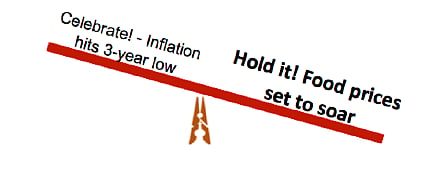
Time for the Gene Revolution – Main Article
Malcolm Elliot, founding director of Borlaug Institute for Global Food Security, comments on the Supreme Court of India’s decision in October 2012 to recommended a 10-year ban on field trials of genetically-engineered food crops. On November 9, the court refused to accept the recommendations made by the technical expert committee pending a more detailed report.
He argues that anti-biotechnology groups have erroneously linked genetically engineered crops to India’s continuing health issues and economic failures. They have chosen to overlook the rigorous scrutiny and safety of each genetically engineered product in the course of its development.
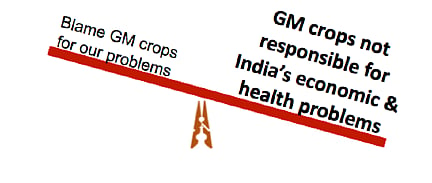
For a Change – Editorial
The Prime Minister’s retort to a “backdated” Mamata Banerjee raises the pertinent point that her outdated ideologies are holding India back in the wake of her refusal to back the government’s economic reforms.
Jug Suraiya states that India is at the crossroads of being a “static society” – one that is resistant to change or a “dynamic society” – one that is willing to embrace change. He cites gender discrimination, honour killings, ban on inter-caste marriages, female foeticide and rape as examples of “backdatedness”.
Change is not only desirable and inevitable, it is also beneficial. A dynamic society will benefit greatly from its acceptance of change as long as its pace is moderated.

Comment Policy: We encourage discussion and debate in our comments, among viewers and writers. However comments that are abusive or personal in nature, will be deleted.

Power NL-TNM Election Fund
General elections are around the corner, and Newslaundry and The News Minute have ambitious plans together to focus on the issues that really matter to the voter. From political funding to battleground states, media coverage to 10 years of Modi, choose a project you would like to support and power our journalism.
Ground reportage is central to public interest journalism. Only readers like you can make it possible. Will you?
